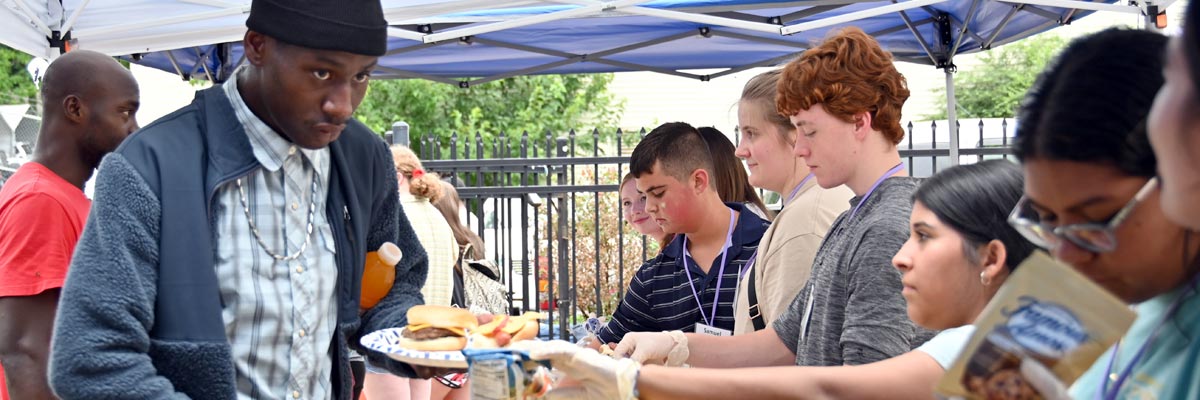Official Website of the
Catholic Diocese of Little Rock
Fifth Sunday of Lent, Year A
Published: March 29, 2020
Bishop Anthony B. Taylor preached the following homily at the Diocese of Little Rock House of Formation in Little Rock on Sunday, March 29, 2020.

Bishop Taylor
Last week we had the story of the man born blind and I spoke of the "Great Fast" of Lent in the early Church, a time when people fasted not only from food, but also from the Eucharist. Indeed in those days the Mass was not even celebrated on the weekdays of Lent in order to heighten the Easter joy when daily Eucharist could now be received again.
We saw how through restoring his sight, Jesus led the man born blind step by step to explicit faith in him as “the Son of Man” and thus the adversity in that man’s life — he was both blind and a beggar — became the vehicle through which “the works of God might be revealed through him.”
Today Jesus takes us one step further with the story of the raising of Lazarus from the dead, which once again contains a very important message for us in this time when so many people are dying of COVID-19 in so many parts of the world, and so many others already sickened or at risk. Indeed, we are all at risk. But once again Jesus uses adversity to bring people to faith — Lazarus’ death becomes the vehicle that leads to faith.
We are learning to live with uncertainty, and we are learning to trust in God regarding our future. And above all, we realize far more intensely than ever before what a gift it is to be able to gather for worship and receive the Lord in the Eucharist.
Jesus says, “this illness is not to end in death, but is for the glory of God, that the Son of God may be glorified through it.” Notice: Jesus was called the Son of Man in the blind beggar story, now he is called the Son of God. Contrary to Jesus’ words, this illness did end in death, but that wasn’t the end of the story. And in the meantime, what did Jesus do? He wept and he prayed and he comforted his friends Martha and Mary, and then he asks them to put their faith in him, that whatever happened, all the pain that they were feeling, would ultimately serve God’s purposes.
As the story unfolds, Jesus demonstrates three truths: 1.) The truth that what is true for Jesus is true also for God — just 19 verses earlier Jesus had declared: “The Father and I are one;” 2.) The truth that Jesus’ heart is moved by the painful things in our lives — "Jesus wept,” and thus; 3.) The truth that the Father is moved as well and so feels our pain and responds to our prayers. He loves us and so wants the best for us.
So Jesus prays to the Father, asking him to change his mind and restore Lazarus to life, which is exactly what he now does. “The dead man came out, tied hand and foot with burial bands, and his face wrapped in a cloth.” It must have been pretty scary! Then Jesus said: “Untie him and let him go.”
I think you can see that this story has a lot to say to us. Our future looks pretty scary, at least short term. 1.) We are afraid of the illness itself, especially given its high mortality rate for the elderly and those with compromised immune systems. I have a brother who had leukemia and received a successful stem cell transplant in February, but his immunities are practically zero, so if he were to be infected with COVID-19, it would likely be fatal. I’ll bet every one of you has someone in your life who is especially vulnerable too, about whom you are especially worried too.
And then 2.) We are worried about all the collateral damage: loss of jobs and income; how are you going to pay the bills? The strain of having to give up so many activities — restaurants, movies, abandoned spring break vacation plans. And by far the worst, not being able to attend Mass because all public Masses have been suspended in an effort to save lives and protect people from harm.
But I am convinced that all of this is intended by God to serve as a vehicle that leads to faith — just like with Lazarus and with the man born blind. We are learning to live with uncertainty, and we are learning to trust in God regarding our future. And above all, we realize far more intensely than ever before what a gift it is to be able to gather for worship and receive the Lord in the Eucharist.
We miss this so intensely, but let’s not imagine for a second that we have been abandoned. The Lord is simply with us in other ways. Moreover, the Lord whom you have received in all those previous Eucharists is still inside you and his grace doesn’t go away with the passage of time.









